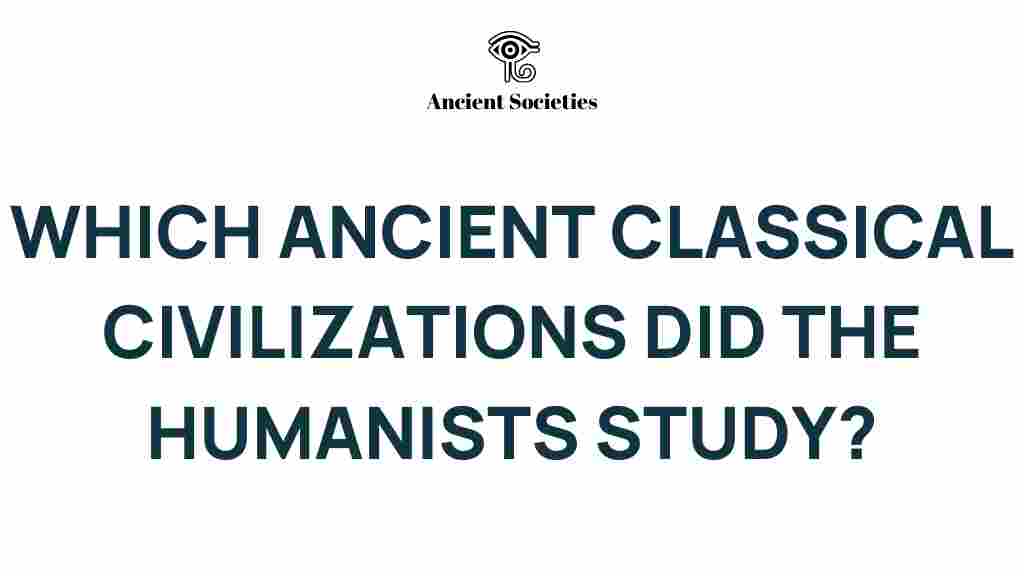Uncovering the Classical Civilizations that Shaped Humanism
Humanism is a pivotal intellectual movement that flourished during the Renaissance, drawing heavily from the classical civilizations of ancient Greece and ancient Rome. This cultural revival placed a significant emphasis on the value of human beings, individualism, and the pursuit of knowledge. In this article, we will explore how these classical civilizations contributed to the development of humanism, the philosophies they espoused, and the educational reforms that emerged as a result.
The Foundations of Humanism in Ancient Greece
Ancient Greece is often regarded as the cradle of Western civilization. The philosophical inquiries and artistic achievements of this era laid the groundwork for humanist thought. Key elements of Greek civilization that influenced humanism include:
- Philosophy: Thinkers like Socrates, Plato, and Aristotle emphasized reason, ethics, and the exploration of human existence. Their works prompted individuals to seek knowledge and understand their place in the universe.
- Individualism: Greek culture celebrated the individual, encouraging citizens to participate in civic life and pursue personal excellence.
- Art and Literature: The Greeks produced timeless literature and art that reflected human experiences, emotions, and ideals. Works such as Homer’s epics and the tragedies of Sophocles explored fundamental human themes.
The philosophical inquiries of ancient Greece emphasized the importance of education and the pursuit of knowledge, which are central tenets of humanism. This focus on learning became a hallmark of the Renaissance, as scholars sought to revive classical texts and ideas.
The Influence of Ancient Rome on Humanism
Following ancient Greece, the Roman Empire further shaped the development of humanistic thought. Romans adopted and adapted Greek philosophies, emphasizing law, governance, and rhetoric. Key contributions from ancient Rome include:
- Legal Philosophy: Roman thinkers like Cicero contributed to the understanding of justice, governance, and the rights of individuals, laying the groundwork for modern legal systems.
- Rhetoric and Oratory: The Romans refined the art of rhetoric, emphasizing the importance of effective communication in public life and governance, which is crucial in humanist education.
- Historical Inquiry: Historians like Tacitus and Livy documented the human experience, providing insights into moral and ethical dilemmas faced by individuals and societies.
Roman contributions to philosophy, law, and history reinforced the humanistic idea that individuals could impact their societies and that understanding human nature was vital to governance and ethics.
The Renaissance: A Cultural Revival
The Renaissance, which began in the 14th century, was a period marked by a renewed interest in the classical civilizations of Greece and Rome. This cultural revival was characterized by:
- Rediscovery of Classical Texts: Scholars known as humanists sought out, translated, and studied ancient texts, leading to a revival of classical knowledge and ideas.
- Artistic Flourishing: Artists like Leonardo da Vinci and Michelangelo drew inspiration from classical themes, emphasizing realism and human emotion in their works.
- Scientific Inquiry: The Renaissance fostered a spirit of inquiry that paved the way for scientific advancements, underscoring the humanistic belief in observation and reason.
The Renaissance was an intellectual movement that transformed Europe, encouraging individuals to explore their potential and engage with the world around them. This period’s emphasis on education and critical thinking was directly influenced by the philosophies of ancient Greece and Rome.
Education and the Humanist Curriculum
Education played a crucial role in the spread of humanism during the Renaissance. The humanist curriculum focused on classical studies, including:
- Grammar and Rhetoric: Mastery of language and effective communication were deemed essential for civic engagement.
- Philosophy and Ethics: Students were encouraged to study moral philosophy to cultivate virtuous citizens.
- History: Understanding historical context was vital for informed citizenship and governance.
This educational model emphasized the importance of a well-rounded individual capable of critical thought and articulate expression. Humanist educators believed that through the study of classical texts, students could cultivate their intellect and contribute meaningfully to society.
The Legacy of Humanism
The impact of humanism extends beyond the Renaissance, influencing various aspects of modern thought and culture, including:
- Modern Philosophy: Humanist principles have shaped contemporary philosophical inquiry, emphasizing reason and individual rights.
- Art and Literature: The humanist tradition continues to influence artists and writers who explore the human condition and individual experience.
- Education: The focus on a liberal arts education, encouraging critical thinking and creativity, traces its roots back to humanist ideals.
The legacy of humanism is evident in various fields, inspiring a commitment to human rights, ethical governance, and cultural appreciation.
Troubleshooting Tips for Exploring Humanism
If you’re interested in delving deeper into the study of humanism and its classical roots, consider the following tips:
- Start with Primary Texts: Engage with the works of classical philosophers such as Plato and Aristotle to understand foundational ideas.
- Explore Artistic Works: Analyze Renaissance art and literature to see how humanist themes are expressed through various mediums.
- Join Discussion Groups: Participate in forums or study groups focused on humanism to share insights and deepen your understanding.
- Utilize Online Resources: Make use of educational platforms and online courses that offer insights into humanist philosophy and its historical context. For more resources, check out this link.
Conclusion
Humanism represents a significant chapter in the history of ideas, deeply rooted in the classical civilizations of ancient Greece and ancient Rome. This intellectual movement not only transformed education and culture during the Renaissance but also continues to influence contemporary thought. By studying the philosophies and achievements of these classical civilizations, we gain valuable insights into the human experience and the importance of cultivating knowledge and virtue. Embracing the legacy of humanism can inspire us to engage with the world meaningfully and promote the value of education in shaping a better future.
For further reading on the connections between humanism and classical civilizations, check out this external resource.
This article is in the category History and created by AncientSocieties Team
